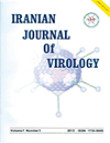Seroprevalence of Antibodies against Varicella Zoster Virus among Women before Marriage in Yazd, Iran
Author(s):
Abstract:
Background And Aims
Varicella-zoster virus (VZV) infection among pregnant women can cause a serious threat to the health of mother and fetus. Varicella is clearly less dangerous for immunized mothers. The aim of this study was to determine the prevalence of VZV antibody among women before marriage.Materials And Methods
This cross-sectional study was conducted on 300 women of child-bearing age who referred to Yazd clinic for premarital screening. The enzyme-linked immunosorbent assay (ELISA) technique was performed to detect antibodies against VZV. Demographic characteristics of each participant, including age, educational level, place of residence, family and self-reported history of chickenpox were collected by a questionnaire.Results
Mean age of women under study was 23±5.4 years that 223 participants (73.7%) were seropositive, and 77 cases (25.7%) were seronegative for anti-VZV antibody, while 2 (0.6%) subjects had an equivocal result. A higher immunity ratio (86.4%) was found among older women (33-44 years). Data showed no significant correlation between immunity to VZV and age, educational level, place of residence. A statistically significant association was found between the family history, self-reported history of chickenpox and immunity to VZV. The positive and negative predictive values for self-reported history of chicken pox were 97.1% and 81.1%, respectively.Conclusions
A significant number of women before marriage had no immunity to VZV. They are in risk of getting varicella, which can cause serious complications in mother and fetus. It, therefore, seems necessary to screen women of child-bearing age for anti-VZV antibody. In addition, vaccination against VZV in Iranian women before marriage can be a good recommendation. Keywords:
Language:
English
Published:
Iranian Journal of Virology, Volume:10 Issue: 2, Spring and Summer 2016
Pages:
1 to 6
https://magiran.com/p1717303


